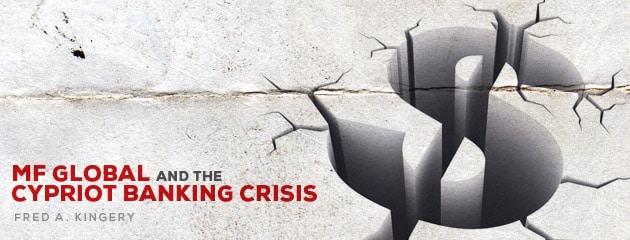
Editor’s note: A version of this article first appeared at Forbes.com.
With MF Global (MFG) recently disclosing more details on its bankruptcy and liquidation, let’s quickly review the financial debacle that came to fruition under former New Jersey governor, former U.S. senator, and former Goldman Sachs chairman, Jon Corzine. Moreover, let’s relate it to the current debacle in Cyprus. There are some quite troubling similarities.
MFG was a small commodity broker, a marginal operation by many standards or metrics; then along came Jon Corzine. He was looking for a new opportunity to make more money than he already had—which was substantial to begin with. So he was offered a chance to expand the MFG business model by setting up an in-house, proprietary securities trading operation.
To make a long story short, he massively overleveraged the company’s capital base by borrowing money to buy high-yield Italian and Greek sovereign debt on the theory that Italy and Greece would always be good for the principle and interest. However, the secondary market value for the bonds he bought collapsed, and MFG was hit with a massive margin call. (MFG would have to put up more cash, margin, in order to continue to hold the bond position, so as to avoid being forced to sell the bonds in the trading account and book a loss that would, in turn, bankrupt MFG.) So, what to do?
Mr. Corzine went to all of his friends on Wall Street, hat in hand, and asked for additional short-term financing in order to forgo the day of reckoning. But no additional cash was forthcoming. Then, somehow, over one billion dollars’ worth of segregated customer cash from the commodity brokerage side of MFG found its way into the proprietary speculative trading arm of MFG in order to “temporarily” meet the margin call. This was simply sending good money after bad and—in short order—that “temporary” cash was lost as the bond position deteriorated further and forced the bankruptcy of MF Global.
Segregated customer money should be just that, segregated. It is meant to be kept separate from all other parts of MFG’s operations.
Segregated money belongs to the customers; it’s their property. The taking of this cash was a theft. Many in the financial community saw what happened at MFG as more than appalling. The act shattered a more-than-century-old trust that had stood the test of time. Customer cash was to be segregated capital, never to be touched by anyone other than the customer—ever.
Now comes along the banking crisis in Cyprus.
The banking system in Cyprus is very small by international standards, but the country’s two large banks are both essentially bankrupt. In order to avoid collapse, they need a capital infusion. They need cash now. So, what to do?
Being a member of the European Union, Cyprus turned to the Euro Finance Ministers and what is known as the Troika, which is the European Central Bank (ECB), International Monetary Fund (IMF), and the European Commission (EC). These institutions represent the financial fire brigade for the EU. Since the Cypriot banks already have worthless equity and minimal long-term senior debt, the only thing left of value would be the customer deposits at the banks. The financial fire brigade knew this and decided to impose a condition on the Cypriot government in order to gain access to any capital infusion for the banks. The condition is that the Cypriot government had to steal depositors’ money. Oh, they called it a onetime “emergency tax” or a “levy”—but it would be the taking of private property by the government no matter what it’s officially called.
Of course, some may argue that government does this all the time via the tax or levy. They do in a sense, but the difference this time is the sanctioning of the theft by the financial fire brigade on the depositors of a bank. This legal plunder is new. This is like a onetime wealth tax on bank depositors. It’s a confiscation of property—thievery—pure and simple. The significance of the act is the shattering of trust and the precedent it sets.
As of the moment of this writing, the Cypriot parliament rejected the initial call to enact the “tax” on depositors in some form or another, but the fundamental point still stands: trust and precedent have been respectively shattered and set.
The example of MF Global and the Cypriot bank bailouts are small potatoes, given the amounts of money involved. Nevertheless, how these bailouts affect the confidence and trust in the global financial system cannot be underestimated.
In the case of MF Global, nobody went to jail. They should have. In fact, a lot of people probably should be in jail. In the case of the Cypriot bank bailout, the government revealed a similar level of fraudulent intent by entertaining the idea of potentially sanctioning the theft of depositors’ cash—which would be a daylight drive-by robbery where no one is going to go to jail.
So, what does all of this say about the modern global financial system? If you are thinking it is corrupt and rotten to the core, you are correct.

